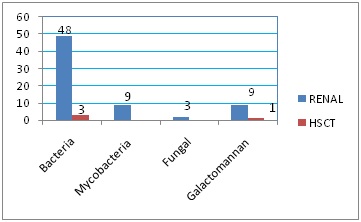Microbiological profile of transplant recipients in a tertiary care hospital in South India
Abstract
Introduction: Infections are the leading cause of morbidity and mortality in transplant recipients. Advances in transplantation biology, organ procurement, surgical techniques, and immunosuppressive therapy have made organ transplantation an effective option for the management of organ failure, with a 1-year survival >60%-80%. However, infection remains one of the most challenging complications of transplantation.
Materials & Methods: A total of 1156 clinical specimens from 300 patients who under-went solid organ (renal, liver, heart) & HSCT at Nizams Institute of Medical Sciences over a period of one year were included in the study. The specimens were investigated for microbiological staining, culture, antimicrobial susceptibility testing (AST) and Galactomannan (GM). Samples were processed as per the standard procedures.
Results: Of the 1156 specimens received from Solid Organ Transplant/ Haematopoietic Stem Cell Transplant recipients, the majority were fromRenal transplant recipients (n= 1107, 95.76%) followed by HSCT (n=38, 3.28%). The rest were from recipients of liver (n=8), heart (n= 2) and heart- lung (n=1). About 63 showed growth on bacterial or fungal culture. SOT - 60 were culture positive, all were from renal transplant recipients. Most were UTI (n= 32, 53.3%) followed by Blood Stream Infection (n= 13, 21.6%). The other infections seen were pneumonia, wound infection.Of the bacterial isolates (n=49) gram negative- 40 (81.6%) gram positive- 9 (18.4%). E.coli was the predominant isolate (21, 52.5%). Drug resistance was seen in 19 isolates (38.77%), of which 6 were ESBL (31.5%), 13 multi drug resistant (68.4%). Mycobacteria- detected in 9 (n= 52 samples) of which 8 showed M. tuberculosis and one M. abscessus. MDRTB detected in 1 case. 9 patients were diagnosed with Probable Invasive Aspergillosis. Candida parapsilosis reported from a patient with sepsis.GMS stain showed P. carinii in one patient. HSCT-3 bacterial isolates were reported of which one strain was resistant to carbapenems. One Probable case of Invasive Aspergillosis reported.
Conclusion: Urinary tract infections were predominant with most isolates multi drug resistance. Infection control measures should be used to decrease the incidence and bacterial resistance of infections.
Downloads
References
2. Moreno A, Cervera C, Gavaldá J, et al. Bloodstream infections among transplant recipients: results of a nationwide surveillance in Spain. Am J Transplant. 2007 Nov;7(11):2579-86. Epub 2007 Sep 14.[pubmed]
3. Ko KS, Cho DO, Ahn JH, Lee TW, Ihm CG, Chang SG, Chai SE, Park HC, Hong SH, Joo HZ, et al: Infections after renal transplantation. Transplant Proc 1994;26: 2072–2074.
4. Charfeddine K, Zaghden S, Kharrat M, Kamoun K, Jarraya F, Hachicha J. Infectious complications in kidney transplant recipients: a single center experience. Transplant Proc. 2005;37:2823– 2825.[pubmed]
5. Collee JG, Miles RB, Watt B. Mackie and McCartney Practical Medical Microbiology. 14th ed. Churchill Livingstone; 1996. Test for identification of bacteria. In: Collee JG, Fraser AG, Marimion BP, Simmons A, editors; pp. 131–49. (reprinted 2008)
6. Splendiani G, Cipriani S, Tisone G, Iorio B, Condo S, VegaA, et al. Infectious complications in renal transplant recipients. Transplant Proc. 2005;37(6):2497–2499.
7. Pourmand G, Salem S, Mehrsai A, et al. Infectious complications after kidney transplantation: a single-center experience. Transpl Infect Dis. 2007 Dec;9(4):302-9. Epub 2007 May 19.
8. Maraha B, Bonten H, van Hooff H, et al. Infectious complications and antibiotic use in renal transplant recipients during a 1-year follow-up. Clin Microbiol Infect. 2001 Nov;7(11):619-25.[pubmed]
9. Ferraresso M, Berardinelli L. Nosocomial infection in kidney transplant recipients: a retrospective analysis of a single-center experience. Transplant Proc. 2005 Jul-Aug;37(6):2495-6. DOI:10.1016/j.transproceed.2005.06.029.
10. Fishman JA, Issa NC. Infection in organ transplantation: risk factors and evolving patterns of infection. Infect Dis Clin North Am. 2010 Jun;24(2):273-83. doi: 10.1016/j.idc.2010.01.005.[pubmed]
11. Oguz Y, Doganci L, Bulucu F, et al. Acute pyelonephritis causing acute renal allograft dysfunction. Int UrolNephrol. 2002;34(3):299-301.[pubmed]
12. Senger SS, Arslan H, Azap OK, Timurkaynak F, Çag˘irÜ, Haberal M. Urinary tract Infections in renal transplant recipients. Transplant Proc. 2007;39(4):1016 –1017.
13. Ak O, Yildirim M, Kucuk HF, et al. Infections in renal transplant patients: risk factors and infectious agents. Transplant Proc. 2013 Apr;45(3):944-8. doi: 10.1016/j.transproceed.2013.02.080.[pubmed]
14. Berry CL. Transplantation pathology. New york city: Springer science and business media; 1999;19-31.
15. Veroux M, Giuffrida G, Corona D, et al. Infective complications in renal allograft recipients: epidemiology and outcome. Transplant Proc. 2008 Jul-Aug;40(6):1873-6. doi: 10.1016/j.transproceed.2008.05.065.[pubmed]
16. Patel R, Paya CV. Infections in solid-organ transplant recipients. Clin Microbiol Rev. 1997 Jan;10(1):86-124.[pubmed]
17. Snydman DR. Epidemiology of infections after solid-organ transplantation. Clin Infect Dis. 2001 Jul 1;33 Suppl 1:S5-8. DOI:10.1086/320897.[pubmed]
18. Daskalaki E, Koukoulaki M, Bakalis A, et al. Blood stream infections in renal transplant recipients: a single-center study. Transplant Proc. 2014 Nov;46(9):3191-3. doi: 10.1016/j.transproceed.2014.10.033.
19. Singh N, Paterson DL. Mycobacterium tuberculosis infection in solid-organ transplant recipients: impact and implications for management. Clin Infect Dis. 1998 Nov;27(5):1266-77.[pubmed]
20. Kiuchi T, Inomata Y, Uemoto SA, et al. Hepatic graft tuberculosis transmitted from a living-related donor. Transplantation 1997; 63: 905-7.
21. Allen U, Green M. Prevention and treatment of infectious complications after solid organ transplantation in children. Pediatr Clin North Am. 2010 Apr;57(2):459-79, table of contents. doi: 10.1016/j.pcl.2010.01.005. [pubmed]
22. Falkinham JO 3rd. Nontuberculous mycobacteria in the environment. Clin Chest Med. 2002 Sep;23(3):529-51.[pubmed]
23. Bassem Hamandi, Shahid Husain, Paul Grootendorst, Emmanuel A. Papadimitropoulos. Clinical and microbiological epidemiology of early and late infectious complications among solid organ transplant recipients requiring hospitalization. Transplant International 2016;29(9):1029-1038.
24. Isabel Trouillhet, Natividad Benito, Mari´a Angeles Marcos, Carlos Cervera, Federico Oppenheimer, Paula Rivas, Jorge Puig de la Bellacasa, FedericoCofa´n, Toma´s Pumarola and Asuncio´n Moreno-Camacho. Influence of Age in Renal Transplant Infections: Cases and Controls Study. Transplantation.2005; 80 (7): 989-992.
25. Khan A, El-Charabaty E, El-Sayegh S. Fungal infections in renal transplant patients. J Clin Med Res. 2015 Jun;7(6):371-8. doi: 10.14740/jocmr2104w. Epub 2015 Apr 8.[pubmed]



 OAI - Open Archives Initiative
OAI - Open Archives Initiative


